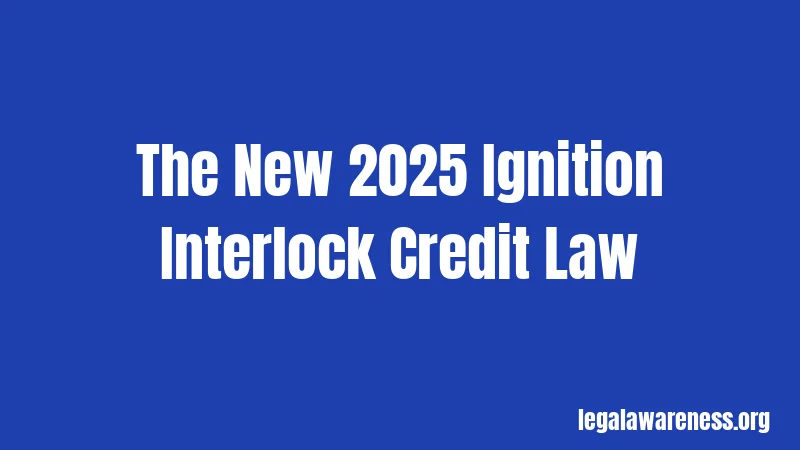DUI Laws in New Jersey (2026): Penalties Hit Hard
Most people don’t realize how strict New Jersey really is about drunk driving. Like, seriously strict. The fines stack up fast, the license suspensions kick in immediately, and those ignition interlock devices? You’re probably paying for one. Let’s break down what you actually need to know about DUI laws in the Garden State.
Oh, and quick note. New Jersey calls it DWI (Driving While Intoxicated) when alcohol is involved. DUI technically refers to drugs. But most people use the terms the same way, so we’ll cover both here.
What Is DWI in New Jersey?

In New Jersey, you’re breaking the law if you drive with a Blood Alcohol Content of 0.08% or higher. That’s the standard limit for drivers 21 and older.
Younger drivers face even tougher rules. Anyone under 21 can get charged with just 0.01% BAC. Yep, that’s basically zero tolerance. Even a tiny amount of alcohol can land you in trouble.
Commercial drivers have their own limit too. For them, it’s 0.04%. Lower standards come with the job.
Here’s where it gets interesting. You don’t actually have to be driving to get charged. If you’re sitting in your car with the keys in the ignition and you’re drunk, that counts. The law looks at whether you had “intent to drive.” So even if the car isn’t moving, you could still face charges.
Basic DWI Laws and Penalties
New Jersey doesn’t mess around with DWI penalties. The state hits you with fines, license suspensions, mandatory classes, and those ignition interlock devices we mentioned. Let’s break it down by offense.
First Offense
Your first DWI comes with different penalties depending on your BAC level.
If your BAC is between 0.08% and 0.10%, you’re looking at fines between $250 and $400. Your license gets suspended until you install an ignition interlock device. You’ll need that device for three months minimum.
You also have to complete a 12-hour program at the Intoxicated Driver Resource Center. That’s basically alcohol education and evaluation. The IDRC program costs $264, and you’ll pay another $200 in fees to the Motor Vehicle Commission.
Oh, and there’s a $1,000 insurance surcharge. Per year. For three years. That adds up quick.
If your BAC is 0.10% or higher, things get worse. Fines jump to $300-$500. The ignition interlock requirement extends to 7-12 months. You might also face up to 30 days in jail, though that’s not always enforced for first-timers.
Drug-related DUIs follow the same pattern as high-BAC cases. Seven to twelve months of license suspension, plus all the other penalties.
Second Offense
Second offenses within 10 years get serious fast. You’re looking at $500-$1,000 in fines. Jail time becomes mandatory: 48 hours to 90 days.
Your license suspension jumps to two years. The ignition interlock device stays in your car for one to three years after you get your license back.
You’ll also complete a 48-hour IDRC program. This one’s different from the first offense. It’s two full days straight, usually held over a weekend at a detention facility. You stay overnight. Bring comfortable clothes and toiletries.
The IDRC fee for second offenders is $321. Plus you still owe those MVC fees. And yes, the $1,000 annual insurance surcharge applies here too.
Community service gets added to the mix. Thirty days worth.
Third Offense and Beyond
Third DWI convictions are brutal. The fine is $1,000. Jail time is mandatory: 180 days minimum.
Your license gets suspended for eight years. Some sources say it can be up to 10 years. Either way, that’s a long time without driving privileges.
The ignition interlock requirement lasts two to four years after reinstatement. You’ll attend another IDRC program. And if the court orders it, you might spend 90 of those 180 jail days in an inpatient treatment program instead.
The New 2025 Ignition Interlock Credit Law

Okay, this one’s important. Hold on.
In April 2025, New Jersey changed the rules around ignition interlock devices. The new law offers something called “2-for-1” credit.
Here’s how it works. If you voluntarily install an ignition interlock device before your conviction, you can earn credits toward your license suspension. For every two days you have the device installed, you get one day of credit off your suspension.
Install it early enough and you might avoid a full license suspension entirely. Pretty smart move if you’re facing charges.
This only applies to alcohol-related DWI cases. Drug DUIs don’t qualify. The law technically went into effect April 3, 2025, but some lawyers argue it should apply retroactively to offenses from February 19, 2024, onward.
Not everyone qualifies though. Commercial vehicle cases involving drugs are excluded. And you need to get an interlock-restricted license from the MVC within seven days of installation to make this work.
Honestly, if you’re facing DWI charges, talk to a lawyer about this option. The potential savings in suspension time can be huge.
Refusing the Breathalyzer Test
New Jersey has an “implied consent” law. When you drive here, you automatically agree to take a breath test if a cop suspects you’re drunk. Refuse that test and you face separate penalties on top of any DWI charges.
First refusal: seven months to one year license suspension. Fines of $300-$500.
Second refusal: one to two years suspension. Fines of $500-$1,000.
Third refusal: eight years suspension. $1,000 fine.
The kicker? Refusal penalties usually run consecutively with DWI penalties. So if you refuse AND get convicted of DWI, those suspensions stack up. Your first refusal plus first DWI could mean suspension periods back-to-back, though judges sometimes allow them to run at the same time for first offenses.
Most lawyers will tell you refusing isn’t worth it. The penalties are often worse than if you’d just taken the test.
Ignition Interlock Devices: What You Need to Know

Let’s talk about these devices in more detail. Because if you get a DWI in New Jersey, you’re probably getting one.
An ignition interlock device is basically a breathalyzer installed in your car. You blow into it before starting the engine. If it detects alcohol above 0.05% BAC, your car won’t start.
The device also asks for “rolling retests” while you’re driving. You’ll get about six minutes to pull over safely and blow into it again. Miss the retest and the device records a violation. Your horn might honk and lights might flash until you comply or turn off the car.
Installation and Costs
Installation runs about $100-$150 with most providers. Monthly fees range from $60 to $140 depending on which company you use. That works out to roughly $2.50-$3.50 per day.
You’ll also pay for monthly calibrations, which typically cost $60-$80. And there’s a removal fee at the end.
Financial help is available if you meet certain income requirements. Some providers offer payment plans. You need to show proof of government assistance to qualify.
New Jersey has several approved providers: Smart Start, LifeSafer, Intoxalock, and Interlock Device of New Jersey. Shop around. Prices vary significantly between companies.
Rules and Violations
The device must be installed in every vehicle you own, lease, or regularly drive. That includes work vehicles. Your license will show an “interlock restriction” notation.
Drive a vehicle without the device and your suspension gets extended by one year. Let someone else blow into it for you? That’s a criminal offense. They could face a $1,000 fine and six months in jail. You could face additional suspension time.
Tampering with the device is also a criminal offense.
Calibrations happen every 60-67 days. Miss an appointment and you’re in violation. The provider reports all violations to the MVC.
The IDRC Program Explained
The Intoxicated Driver Resource Center program is mandatory for everyone convicted of DWI. You can’t get your license back without completing it.
First offenders attend a 12-hour program. It runs six hours per day for two consecutive days, usually on weekends. You’ll sit through educational sessions about alcohol, drugs, and driving. You’ll meet with a counselor for evaluation.
The cost is $264. Payment is typically by money order or certified check only. Some counties accept online payment.
Second offenders do 48 consecutive hours at a regional detention facility. You stay overnight. Bring a pillow, blanket, toiletries, and comfortable clothes. No electronic devices allowed. Meals are provided.
Second offender fee: $321.
After screening, the IDRC might refer you to additional treatment. This could mean a 16-week program minimum. You’re responsible for those costs too. Treatment monitoring can last up to one year.
Skip the IDRC or fail to complete treatment and you face consequences. Your license suspension extends indefinitely. You could get two days in jail for non-compliance.
Out-of-State Residents
Don’t live in New Jersey? You still have to comply. If you live within about one hour of a New Jersey IDRC, you’ll attend there. If you live farther away, you might complete an equivalent program in your home state.
Either way, you still pay the $200 in MVC fees. Your driving privileges in New Jersey stay suspended until you comply.
Aggravating Factors That Make Things Worse
Certain circumstances make DWI penalties more severe. These aggravating factors can bump charges up to higher offense levels or add extra penalties.
Having a minor under 17 in the car is a big one. This triggers harsher sentencing.
Causing an accident with injuries leads to elevated charges. Serious injuries or death can result in felony charges with years of prison time.
Driving with a suspended license while drunk compounds your legal troubles. This usually adds more jail time and extends suspensions even further.
Being on school property or in a school zone can increase penalties too.
Getting Your License Back
Restoring your license after a DWI involves several steps. You can’t skip any of them.
First, complete all court-ordered requirements. That means serving any jail time, finishing IDRC, and completing any treatment programs.
Install the ignition interlock device through an approved provider. Get proof of installation and submit it to the MVC within seven days.
Pay all fines and fees. This includes court fines, IDRC fees, MVC restoration fees, and insurance surcharges.
Wait out your suspension period. With the new interlock credit law, this might be reduced if you installed the device early.
Apply for license restoration at the MVC. Bring all completion certificates and proof of insurance.
Your new license will have an “interlock restriction” notation. This stays on there for as long as you’re required to keep the device.
Special Circumstances and Exceptions
Underage Drivers
Drivers under 21 face zero tolerance. A BAC of just 0.01% triggers penalties. License suspension runs 30-90 days. Community service of 15-30 days is required. You’ll also attend IDRC or similar treatment.
These aren’t criminal charges though. They’re administrative violations. Still serious, but handled differently than adult DWI cases.
Commercial Drivers
Commercial license holders have a 0.04% BAC limit. A DWI conviction means losing your CDL for at least one year. Second offense? Lifetime ban.
This applies even if you’re driving your personal vehicle at the time. A DWI in your car can cost you your commercial driving career.
Medical Marijuana and Prescription Drugs
Having a medical marijuana card doesn’t protect you from DUI charges. If you’re impaired while driving, you can be charged regardless of whether your drug use is legal.
Same goes for prescription medications. If they impair your driving ability, you can face DUI charges. Read the warning labels on your prescriptions.
How Police Can Stop You
Police need reasonable suspicion to pull you over. Common reasons include:
Swerving or weaving between lanes. Driving too slowly. Running red lights or stop signs. Making illegal turns. Having equipment violations like broken taillights.
After pulling you over, they look for signs of intoxication. Bloodshot eyes. Slurred speech. Smell of alcohol. Open containers in the vehicle.
They might ask you to perform field sobriety tests. These are voluntary. You can refuse them without the same penalties as refusing a breathalyzer.
The breathalyzer test at the station is different though. That’s the one covered by implied consent. Refuse that and you face those harsh penalties we talked about earlier.
What to Do If You’re Arrested
Here’s the deal. Stay calm and be polite. Don’t argue with the officer.
You have the right to remain silent. Use it. Don’t try to explain or defend yourself. Anything you say can be used against you.
Ask for a lawyer immediately. New Jersey law allows you to contact an attorney, though they might not arrive before you’re tested.
Remember details. Note the time, location, what the officer said, and how the tests were conducted. This information helps your lawyer later.
Don’t discuss your case with anyone except your lawyer. Not friends, not family, not cellmates if you’re held overnight.
Contact a DWI attorney as soon as possible. These cases have strict deadlines. Evidence gets reviewed. Procedures get challenged. The sooner you have legal help, the better your chances.
Recent Changes and Updates
New Jersey keeps updating its DWI laws. The April 2025 ignition interlock credit change is the most recent major update.
The state also strengthened penalties for repeat offenders in recent years. Enhanced monitoring requirements came with those changes.
Ignition interlock devices became mandatory for all DWI convictions starting December 2019. Before that, only certain cases required them.
The trend is toward rehabilitation rather than pure punishment. The interlock credit system reflects this. It allows people to maintain some driving privileges while ensuring they can’t drive drunk.
Stay informed about changes. Laws can shift. Penalties can increase. What was true last year might not apply this year.
Frequently Asked Questions
Can I get a conditional license while suspended for DWI?
Not exactly. But with the new interlock credit law, you might qualify for an interlock-restricted license. This lets you drive any vehicle equipped with an approved ignition interlock device. It’s not the same as a conditional or hardship license, but it serves a similar purpose.
Will a DWI show up on background checks?
Yes. DWI convictions in New Jersey appear on your driving record and criminal background checks. This can affect employment, professional licenses, housing applications, and insurance rates. The conviction stays on your record permanently unless you successfully challenge it or receive a pardon.
Can I refuse field sobriety tests?
Yes, you can refuse field sobriety tests without the same penalties as refusing a breathalyzer. However, refusal might give the officer more reason to arrest you and request the chemical breath test at the station. That’s the one you really can’t refuse without serious consequences.
How long does a DWI stay on my record in New Jersey?
Forever. New Jersey doesn’t allow expungement of DWI convictions. The conviction remains on your driving record permanently. It also counts toward repeat offender status if you get another DWI within 10 years. After 10 years, a new DWI would be considered a “first offense” for sentencing purposes, but the old conviction still shows on your record.
What happens if I get a DWI from another state while my New Jersey license is suspended?
You’ll face penalties in both states. The other state will prosecute their DWI charge. New Jersey will learn about it through interstate reporting systems and can extend your suspension here. Driving while suspended in any state typically adds more penalties and makes your situation much worse.
Final Thoughts
New Jersey DWI laws are complicated. The penalties are harsh. The costs add up fast. But understanding the rules gives you a fighting chance.
The new ignition interlock credit law offers some relief if you act fast. Installing the device early can save you months of suspension time.
If you’re facing charges, don’t try to handle it alone. Get a lawyer who knows New Jersey DWI law inside and out. They understand the procedures, know the local judges, and can spot violations in how evidence was collected.
Stay off the road if you’ve been drinking. It’s not worth the risk. The penalties destroy finances, kill job prospects, and can land you in jail.
Now you know the basics. Stay informed, make smart choices, and if you ever need specific legal advice, talk to a qualified attorney in your area.
